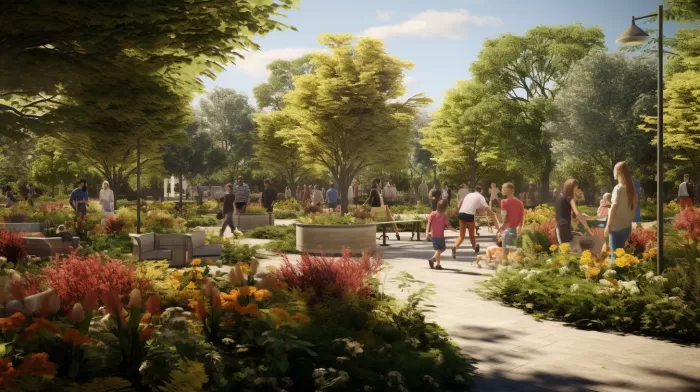The neighborhood you live in can have a significant impact on your health, as well as the health of your children. A study conducted at Oregon State University demonstrates that when pregnant mothers reside in areas with a lot of green spaces—like trees, grass, and vegetation—they are more likely to give birth at full term, and their babies have a higher chance of achieving a healthy weight compared to newborns living in urban, concrete-jungle environments.
Surprisingly, research shows that this strong correlation between green neighborhoods and healthy birth outcomes remains even when other factors such as air pollution and noise are taken into account.
Green spaces might offer psychological benefits such as stress reduction and decreased chances of depression, which could be important drivers of healthier pregnancies and higher birth weight babies. While the exact mechanism remains unclear, the researchers suggest that the psychological and social effects of green spaces may play a critical role.
A Closer Look at the Research
The study involved an analysis of approximately 64,000 births. Results showed that the odds of giving birth very prematurely were 20% lower in green neighborhoods compared to predominantly concrete and asphalt neighborhoods. The likelihood of a moderate preterm birth decreased by 13%.
Interestingly, the researchers also found that newborns in green neighborhoods were less likely to be classified as small for their gestational age at birth. In fact, the babies born in green neighborhoods weighed, on average, 45 grams more than those born in urban areas.
According to Perry Hystad, an environmental epidemiologist at Oregon State and one of the researchers involved in the study, you don’t see the beneficial effects of green spaces until a certain threshold is reached in a community.
The Value of Nature and Green Spaces
This research highlighting the potential benefits of green spaces goes beyond the implications for pregnant women and their babies. There is a growing body of evidence to suggest that interacting with nature can have significant benefits for everyone’s mental and physical wellbeing.
For instance, studies have shown that spending time in nature can help reduce stress, anxiety, and depression, and can even improve cognitive functions like memory and attention. Harvard Medical School’s Harvard Health Publishing suggests that spending as little as 30 minutes per week in nature can improve mental health and wellbeing.
Moreover, living or spending time in green spaces has been associated with better overall cardiovascular health, improved immune system function, and even lower rates of type 2 diabetes.
Tips for Increasing Green Space
Numerous resources and organizations are working to help maintain or improve green spaces in cities and neighborhoods. This serves not only to improve the environment for current residents but can also significantly benefit the health and wellbeing of future generations.
Here are a few ideas to help enhance the greenery in your community:
- Start a community garden: Community gardens can rejuvenate unused land, provide space for locals to grow their own produce, and promote a sense of belonging and connection to your neighborhood. Plus, they create a beautiful green space that can offer health benefits for residents.
-
Join or create a local parks group: Local parks organizations often need volunteers to help maintain and improve park spaces. You can make a difference by joining such a group or even starting one in your neighborhood if it doesn’t already exist.
-
Speak up at city council meetings: Advocate for more investment in green spaces, like parks, trails, and vegetable gardens. Make sure your voice is heard by attending local government meetings and sharing your concerns and ideas for improving the green spaces in your community.
-
Plant trees and other vegetation: Planting trees, shrubs, and other plants can enhance the beauty and wellbeing of your neighborhood. If you live in an apartment complex, consider raising funds and rallying support to improve your building’s landscaping.
Undoubtedly, the research supports the fact that green spaces can serve as an essential factor in promoting good health and wellbeing for people in every stage of life, including unborn babies. If you’re looking to start a family or simply improve your own health, consider the environment you’re living in and prioritize green spaces in your community.



